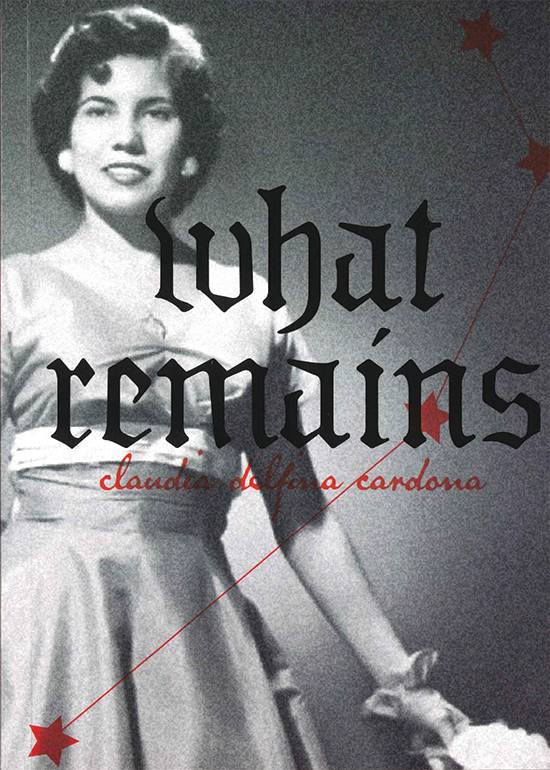
What Remains
by Claudia Delfina Cardona
Austin: Host Publications, 2020.
45 pp. $10.00 paperback.
Reviewed by
Matthew Tavares
“Cardona’s poems detail moments of passion that are either youthful and innocent, or lustful and wild, or a strange mixture of both. These poems also embrace heartache, while simultaneously asserting the importance of individual identity through the memory of what has broken us.”
In her debut poetry collection, What Remains, Claudia Delfina Cardona explores the individual’s need for love—in all its forms—against the backdrops of identity, desire, and her hometown of San Antonio. These poems are reminders of love’s fickleness, of how easily it can be lost and then found again. Cardona’s poems detail moments of passion that are either youthful and innocent, or lustful and wild, or a strange mixture of both. These poems also embrace heartache, while simultaneously asserting the importance of individual identity through the memory of what has broken us. It is in this remembering that we encounter not only shame, or emptiness after love takes its leave, but we also encounter ourselves.
The collection opens with, “My Heart is a Tourist Trap,” a lyric poem that introduces Cardona’s graceful style and to her hometown of San Antonio, Texas. The poem begins with one of San Antonio’s most iconic restaurants as metaphor, “Mi Tierra”: “I want to believe that the chambers / of my heart look like Mi Tierra. / A thousand rows of golden papel picado / intertwined with a million tiny lights.” From the onset of this initial poem, to the last lines of the final one, Cardona aligns her individuality with her city, and in turn, the city provides metaphors for her to articulate her identity. The metaphorical articulation of identity can be found furthermore in the poem, “Heaven,” where the setting is a popular San Antonio park during a Fourth of July celebration. After giving an account of a celebratory Independence Day, Cardona closes with these lines: “The silence that came / after each bouquet of light, / a guessing game of gunshot / or firework, / and the dark plum sky / that could swallow me up.” The metaphorical implications here are darker than the ones in “My Heart is a Tourist Trap”; however, in both places the language works to shape the persona Cardona creates and evokes the violence she carries.
No other poem in the collection so elegantly exhibits Cardona’s understanding of love than “Parachute.” In it, Cardona renounces old constructions of herself so that transformation can occur: “Done with heartbreak cumbia circling / through the edges of my body…Done with feeling ashamed of how I love.” This last denouncement sets the theme of the poem in motion as we are then led to the realizations of how she came to understand love through the eyes of Sandra Cisneros and Gloria Anzaldúa. From this realization, one senses that the act of love for Cardona is “[l]ike a rainbow / parachute on a schoolyard. How it’s pitched upward / and swells with air.” The rest of the poems in the collection hinge on these literary and poetic allusions that call attention to how sometimes even our ways of loving are culturally (or textually) passed down.
Overall, this collection is an extraordinary look into the process of gaining and losing love and how this process redesigns our identity. It is a succinct examination of how an individual copes with the different stages of love, how they take form in her life. These are poems that ask the reader to choose passion over caution; they invite us to desire more from the world than what we think we deserve.
Matthew Tavares is a poet, writer, and high school English teacher. His work can be found in journals such as High Noon, Voices de la Luna, and Sagebrush Review. He is currently pursuing an MFA from Our Lady of the Lake University. He lives in San Antonio with his fiancée and their dog, Luna.
